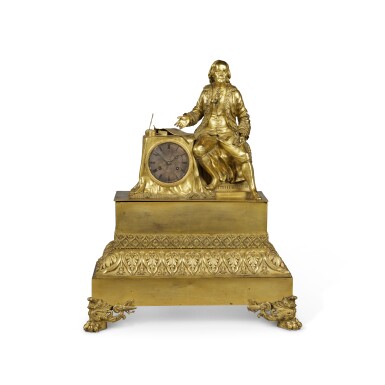Important Americana
Important Americana

Property from a Private Pennsylvania Collection
A Very Fine and Rare Classical 'Benjamin Franklin' Shelf Clock, made for the American Market, attributed to Jacques Nicolas Pierre François Dubuc (1743-1817), Paris, circa 1815
Auction Closed
January 25, 06:34 PM GMT
Estimate
25,000 - 50,000 USD
Lot Details
Description
gilt bronze
height 24 ¾ in. by width 20 in. by depth 9 in.
with the initials FC incised on the works and sterling silver dial
Please note that we have a new registration process and we highly recommend registering early to the sale. If you encounter any difficulty, please contact the Bids Department at bids.newyork@sothebys.com or call +1 (212) 606-7414 for assistance.
Jed Johnson and Judith Hollander, Inc, New York;
Sotheby’s, New York, Property from the Collection of Pierre Bergé, Pierre Hotel New York, November 30, 2004, sale 8025, lot 77.
The present clock is attributed to Jacques Nicolas Pierre Francois Dubuc based on the signed example at the National Gallery of Art in Washington, DC. that is part of the George and Linda Kaufman Collection. Both clocks have the same dimensions, motifs, and castings including that of B. Franklin. Another closely related clock was sold in these rooms in the Highly Important Americana from the Stanley Paul Sax Collection, January 17, 1998, sale 7087, lot 443 and now resides in the collection of the Diplomatic Reception Rooms, Washington, DC (acc. no. RR-1998.0004).
Benjamin Franklin (1706-1790), born in Boston the son of a soap maker and apprenticed to his brother James, a printer, was a newspaperman, scientist, inventor, philosopher, politician, and diplomat of world renown. In 1723 he moved to Philadelphia and launched the Pennsylvania Gazette, which rapidly became the most successful newspaper in the colonies. His Poor Richard's Almanack, which he published from 1733 to 1758, was studded with wry aphorisms Franklin borrowed from numerous sources and frequently rewrote. He helped launch projects to pave, clean, and light Philadelphia's streets and founded the American Philosophical Society, the first circulating library in America, and an academy that grew into the University of Pennsylvania. In 1743 he invented a heat-efficient stove to warm houses. Retiring from newspapering in 1748, he turned to the study of electricity. His observations, including his famous experiment with a kite to verify the identity of electricity and lightning, won him world fame.
Franklin's interest in science ("natural philosophy") was awakened probably in England, where he went in 1757 to represent the colony of Pennsylvania in its quarrel with the descendants of William Penn. He remained there until 1775, becoming agent for several other colonies and de facto ambassador for all thirteen. Every sort of natural phenomenon interested him and called forth some ingenious idea. As early as 1741 he had invented the "Pennsylvania Fireplace," a stove with an open fire-box which heated rooms better at less expense. At first a strong believer in the value of a united empire, Franklin grew disillusioned with England's corrupt politics and aristocratic society; when he returned to America in 1775, he stunned many of his friends and relatives by saying that he was for independence.
Franklin worked with Thomas Jefferson on the Declaration of Independence and served in the Continental Congress before sailing in 1776 to become ambassador to the court of Louis XVI. Dressing as a humble Quaker, he was received by the French people as the personification of all the ideas dear to the Age of the Enlightenment. His simplicity of dress, his wit and wisdom, his natural courtesy, all endeared him to his hosts and made him the object of unmeasured adulation. While he and his colleagues negotiated with foreign minister Vergennes, his mere presence in France intensified popular enthusiasm for the Americans and made it increasingly difficult for France to avoid a rupture with Great Britain. For the next five years, Franklin was a pivotal figure on the European side of the struggle. He soothed French doubts about America, extracted loans, urged influential English friends to push for an early peace, and finally negotiated, with John Jay and John Adams, a separate treaty that won, among many concessions, the Northwest Territory and the trans-Allegheny West.
He returned to America in 1784. Although few of his ideas, such as a unicameral legislature, were adopted at the Philadelphia Constitutional Convention in 1787, Franklin played a major role in the compromises that created the final document. His last public act was a memorial to Congress urging the abolition of slavery, which he signed shortly before his death. That farewell gesture epitomizes the mature Franklin, a far more complex and significant figure than the simplistic image of the success-hungry young businessman in his Autobiography. In many ways Americans have yet to grasp the full range of his accomplishments as a Founding Father. Rising from poverty to affluence, from obscurity to fame, he was equally at ease with rich and poor, the cultivated and untutored; he spoke with equal facility the language of vagabonds and kings, politicians and philosophers, men of letters, kitchen girls, and femmes savantes. The whole world was his field of activity. He was indeed the most universal and cosmopolitan spirit of his age, a true citizen of the world, and yet remained throughout his life more pungently American than any of his famous countrymen. - Wendell D. Garrett
You May Also Like










